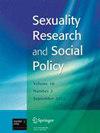在探索男同性恋和双性恋男性中基于正念的构念与饮食行为的关系中,身体接受度的重要性
IF 2.4
2区 社会学
Q1 SOCIAL SCIENCES, INTERDISCIPLINARY
引用次数: 0
摘要
在一般人群和其他特定人群中,正念和基于正念的结构(如自我同情和正念饮食)与问题饮食和身体相关问题呈负相关。探索以正念为基础的概念与问题饮食的关系,将为同性恋和双性恋男性之间这些因素的关系提供新的见解。本研究旨在确定身体接受度在探索基于正念的构念和饮食行为之间的关系中的作用。方法参与者完成一份在线问卷,包括评估正念、自我同情、正念饮食、身体接受、放牧、情绪化饮食、克制饮食和外部饮食(数据收集于2022年)。采用相关性和进一步的中介分析来评估这些结构在当前样本中的关系(n = 164)。结果:身体接受度与正念概念呈正相关,与问题饮食(放牧;情绪性、克制性和外向型饮食)在自认为是同性恋和双性恋的男性样本中被发现。调解分析表明,在探索正念、自我同情和正念进食与放牧、情绪化、克制和外部进食之间的关系时,身体接受度的重要性。结论:研究结果强调了在考虑发展正念和/或基于同情的干预措施以减轻同性恋和双性恋男性的饮食问题时,身体接受的重要性。这项研究巩固了正念和相关结构在考虑问题饮食时的重要性,这应该反映在旨在减少特定人群不健康饮食的政策中。本文章由计算机程序翻译,如有差异,请以英文原文为准。
The Importance of Body Acceptance in Exploring the Relationships of Mindfulness-Based Constructs to Eating Behaviours among Gay and Bisexual Men
Abstract Introduction Mindfulness and mindfulness-based constructs (e.g. self-compassion and mindful eating) have been negatively associated with problematic eating and body-related issues in general and other specific populations. Exploration of mindfulness-based concepts in relation to problematic eating would provide novel insight into the relationships of these elements among gay and bisexual men. The present research aimed to identify the role of body acceptance in exploring previous relationships between mindfulness-based constructs and eating behaviours. Methods Participants completed an online questionnaire, comprising measures assessing mindfulness, self-compassion, mindful eating, body acceptance, grazing, emotional eating, restrained eating and external eating (data collection occurred in 2022). Correlation and further mediation analysis was employed to assess the relationships of these constructs within the present sample ( n = 164). Results Positive associations between body acceptance and mindfulness-based concepts and negative associations to problematic eating (grazing; emotional, restrained, and external eating) were found within a sample of self-identified gay and bisexual men. Mediation analysis showed the importance of body acceptance in exploring relationships between mindfulness, self-compassion, and mindful eating to grazing, emotional, restrained and external eating. Conclusions Findings highlight the importance of body acceptance when considering the development of mindfulness- and/or compassion-based interventions to attenuate problematic eating among gay and bisexual men. Policy Implications This research consolidates the importance of mindfulness and related constructs when considering problematic eating, which should be reflected in policy aiming to attenuate unhealthy eating in specific populations.
求助全文
通过发布文献求助,成功后即可免费获取论文全文。
去求助
来源期刊

Sexuality Research and Social Policy
SOCIAL SCIENCES, INTERDISCIPLINARY-
CiteScore
4.70
自引率
7.70%
发文量
100
期刊介绍:
Sexuality Research and Social Policy is an international multidisciplinary forum for the publication of original peer-reviewed state-of-the-art empirical research on sexuality, theoretical and methodological discussions, and the implications of this evidence for policies across the globe regarding sexual health, sexuality education, and sexual rights in diverse communities. The journal also publishes brief research and conference reports; white papers; book, film, and other reviews; together with guest editorials and commentaries. Sexuality Research and Social Policy occasionally publishes special issues on timely topics.
 求助内容:
求助内容: 应助结果提醒方式:
应助结果提醒方式:


